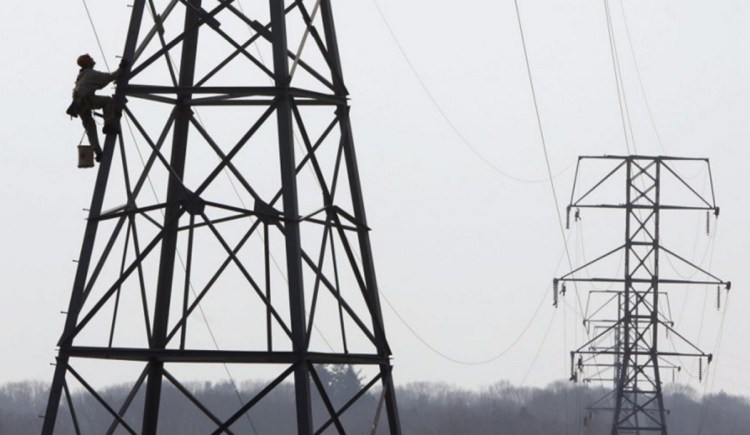A group of elected officials in Franklin County is not revealing what it has requested from Central Maine Power Co. as compensation for a proposed Canada-to-Massachusetts power line project that will cut through the county.
“I don’t negotiate in the press,” said Sen. Tom Saviello, R-Wilton, when asked for details of the request submitted to CMP about two weeks ago.

Saviello, who is also a selectman in Wilton, is part of a group of five elected officials who put together the request. The others are Franklin County District 1 Commissioner Terry Brann, Farmington Selectman Scott Landry, Chesterville Selectwoman Tiffany Estabrook and New Sharon Selectwoman Lorna Nichols.
“We are looking at ways to economically benefit Franklin County that will put us in a better position for the future,” Saviello said. “We’re looking at internet service, cellphone coverage, economic development money, educational money and helping those less fortunate.”
He said a spreadsheet with concepts and financial numbers was submitted to CMP about two weeks ago, and the group expects a response by the end of next week, at which point members will bring it to each town’s board of selectmen.
Saviello said he could not provide more than general concepts of what was asked, while other members of the group said they could not provide details at all. The Morning Sentinel has submitted a public records request for the information.
“I’m not negotiating on behalf of residents,” Saviello said. “I’m negotiating as a senator on behalf of the area to see what I can do. I’m negotiating to have Franklin County treated right.”
In Franklin County, the New England Clean Energy Connect project includes 33 miles of transmission line through unorganized territory and six towns – the four that have members in the group, as well as Jay and Industry.
Each town, with the exception of New Sharon, had written letters of support for the project at the request of CMP, but Saviello said over the summer the towns had incomplete information when they signed the letters, and he asked most of them, as well as county commissioners, if they would join him in seeking more benefits from CMP.
The town of Jay, which CMP estimates will gain $467,933 in new tax revenue each year from the project, did not get involved in the effort because it is happy with those benefits, Town Manager Shiloh LaFreniere said.
The group is made up only of elected officials, although Saviello said members of the public could have joined if anyone had expressed interest.
“We just don’t want to let it out until we know we have some kind of deal going,” Farmington Selectman Landry said. “It’s getting complicated, and we just don’t want anything out there until we know what’s going on.”
Estabrook, the Chesterville selectwoman, also said in an email she wasn’t sure she could provide details of what has been requested.
“I can and will tell you that any committees I serve on, I look at the whole picture and what is best for Chesterville and our surrounding communities,” she said. “My involvement includes wanting to ensure the people of Franklin County have a voice and are represented.”
Brann and Nichols did not respond to requests for comment Thursday. John Carroll, a spokesman for CMP, said the request from Franklin County is still under discussion, and the company “is not prepared to comment on the nature of what they’ve asked for.”
The request follows several discussions in Franklin County and the western part of the state about the benefits, or lack of benefits, associated with having CMP build the 145-mile Quebec-to-Massachusetts transmission line on behalf of the Massachusetts Department of Public Utilities.
Critics of the project say CMP should be offering more benefits to Mainers, citing competing proposals solicited by Massachusetts in New Hampshire and Vermont.
CMP also is offering $50 million in assistance to low-income Massachusetts electric customers as part of the NECEC deal, a move Maine’s Public Advocate recently called “insulting,” saying it raises questions about why Maine isn’t being offered a similar level of assistance.
CMP and its parent company, Avangrid, have touted the economic benefits the project will bring to Maine, although none of the power will be sold in Maine and wind and solar farms will not be able to connect to the line.
Among the project’s benefits, CMP says, are more than 1,700 jobs a year during construction and contributions of $18 million a year in taxes to western Maine communities along the route. CMP also estimates Maine electricity customers will save $40 million over the life of the power contract, based on estimates of future New England wholesale electric costs.
In Somerset County, CMP also signed a separate memorandum of understanding with a conservation group for $22 million in mitigation payments that would help boost tourism and recreation.
Rachel Ohm can be contacted at 612-2368 or at:
rohm@centralmaine.com
Twitter: rachel_ohm
Send questions/comments to the editors.




Comments are no longer available on this story